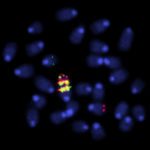Lien vers Pubmed [PMID] – 15718417
Blood 2005 Jun;105(12):4776-83
Nonhomologous end-joining (NHEJ) DNA factors maintain genomic stability through their DNA double-strand break (DSB) repair and telomere-associated activities. Unrepaired or misrepaired DSBs can lead to apoptotic death or chromosomal damage. The B cells of some B-chronic lymphocytic leukemia (B-CLL) patients are resistant to radiation-induced apoptosis in vitro. We show here that the novel DNA-dependent protein kinase (DNA-PK) inhibitor, NU7026 (2-(morpholin-4-yl)-benzo[h]chomen-4-one), and the phosphatidylinositol 3 (PI-3) kinase inhibitor, wortmannin, restored sensitivity to DNA damage-induced apoptosis of otherwise resistant cells. These resistant malignant B cells also escaped DSB-induced apoptosis following exposure to etoposide or neocarzinostatin. We found that at 15 minutes after irradiation, the levels of NHEJ (as measured by an in vitro DSB end-ligation assay) and DNA-PK catalytic subunit (DNA-PKcs) activity were, respectively, 2-fold and 4-fold higher in radio-resistant than in radio-sensitive B-CLL cells or Epstein-Barr virus (EBV)-transformed B cells. Ku70/Ku80 heterodimer DNA end-binding activity was also 2- to 3-fold higher in the resistant B-CLL cell subset compared with the sensitive B-CLL cell subset. Our results provide the first evidence that overactivating the NHEJ DNA repair pathway impairs DNA damage-induced apoptosis in malignant B cells and that this may contribute to their resistance to current chemotherapy.

